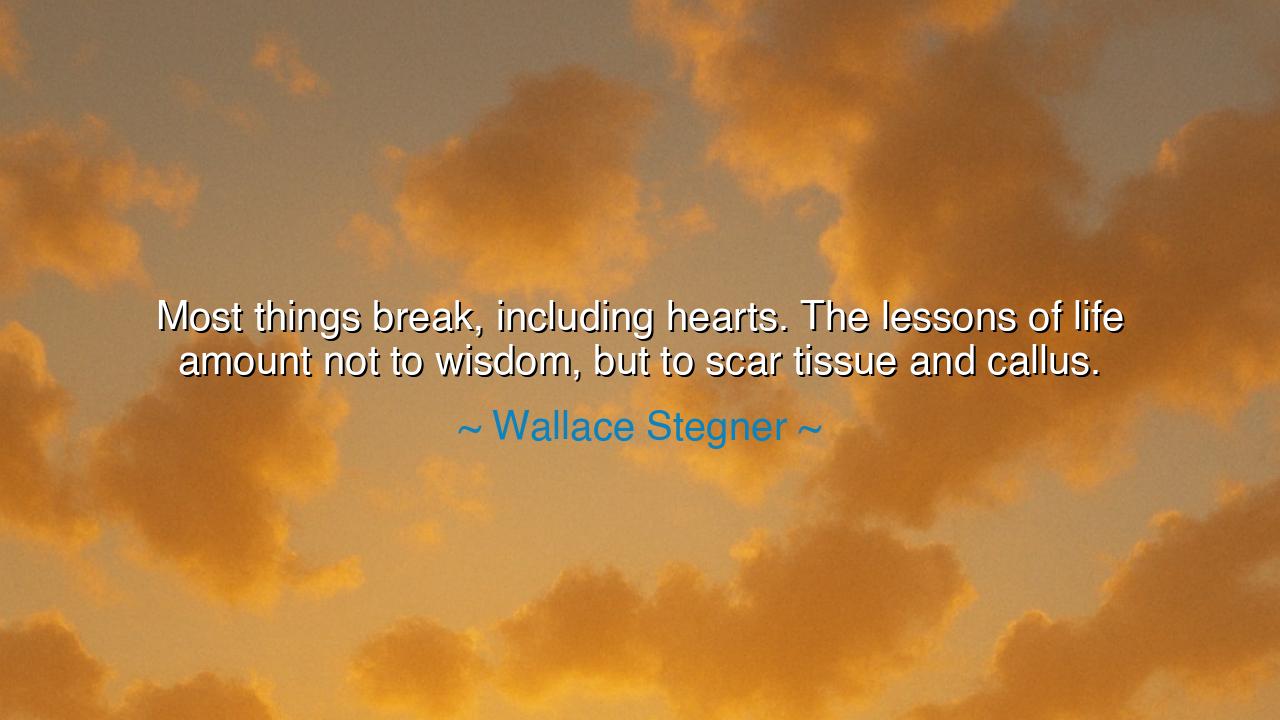
Most things break, including hearts. The lessons of life amount
Most things break, including hearts. The lessons of life amount not to wisdom, but to scar tissue and callus.






Hearken, O children of the heart, to the sobering words of Wallace Stegner, who speaks of the inevitability of breakage in life. He declares that most things break, including even the tender vessels of the soul—the hearts that beat with hope and longing. Herein lies a teaching for the ages: suffering, loss, and disappointment are not merely misfortunes, but the crucibles through which life tempers the spirit, leaving scar tissue and callus in their wake, marks of endurance rather than trophies of wisdom.
The origin of this reflection is rooted in Stegner’s life as a writer and observer of human experience, chronicling the fragile yet resilient nature of existence. In his works, he often explored the interplay of hardship and growth, noting that human beings accumulate lessons not in serenity alone, but through the trials that fracture expectation and strain the heart. Life’s teachings, he asserts, are often felt as wounds rather than as clear insights.
The meaning of this aphorism is profound: the journey of the soul is shaped less by understanding than by survival. Wisdom, in the conventional sense, may not always emerge from suffering; instead, the human heart develops scar tissue and callus, forms of resilience that allow one to endure, to continue, and to face subsequent trials with greater fortitude. Stegner’s counsel reminds us that endurance itself is a measure of life’s education, even when clarity or insight remains elusive.
History provides vivid testimony to this truth. Consider Abraham Lincoln, who endured personal losses, political defeats, and the strife of a nation divided. Each heartbreak and setback left its mark upon him, shaping a resolve that was both protective and guiding. His heart, though repeatedly wounded, carried the callus of experience, allowing him to lead with steadfastness through the crucible of civil war.
Moreover, this teaching extends to all who traverse the vicissitudes of existence. Every loss, disappointment, or betrayal contributes to the fortification of the spirit. The marks of hardship—scar tissue and callus—serve as silent teachers, reminding the soul of its capacity to endure, to recover, and to act with resilience, even if the clarity of wisdom remains distant.
O generations yet unborn, take this counsel into your hearts: embrace the inevitability of breakage, endure the trials of life, and honor the scar tissue and callus that form upon your spirit. For it is through these wounds that the soul grows resilient, the heart learns endurance, and the spirit acquires the strength to face the tempests of existence with courage, fortitude, and quiet understanding.






LTle thuy
This idea hits hard because it feels both cynical and true. Life’s lessons often come through damage, not enlightenment. But I wonder—can scar tissue also represent strength, a kind of earned wisdom? Maybe wisdom isn’t soft insight but the quiet endurance that allows us to keep moving. Still, there’s sadness in thinking that our learning process might also numb us. Is protection worth the loss of tenderness?
TKTran Kien
There’s something deeply human in this thought. It reminds me that time doesn’t erase pain—it just reshapes it into something more durable. But does this durability come at the expense of openness? Can we still love and trust freely once we’ve built up emotional ‘calluses’? I think the quote challenges the idea that suffering always ennobles us; sometimes it just teaches us how to endure, not transcend.
THTa Thu Huong
I find this reflection haunting because it reframes growth as a kind of hardening rather than enlightenment. It makes me question the way we romanticize struggle—as if every heartbreak or failure automatically leads to wisdom. What if, instead, it just leaves us more guarded? I’d love to know if Stegner saw this as tragic or simply realistic—perhaps wisdom is recognizing that healing doesn’t always mean softness.
TKNgo the khanh
This quote feels painfully honest. It makes me think about how life’s hardest experiences don’t always make us wiser in the ideal sense, but tougher, maybe even colder. Is resilience the same as wisdom, or are they opposites? I wonder if, over time, the ‘scar tissue’ that protects us also prevents us from feeling as deeply as before. Maybe surviving life’s pain has both a cost and a gift.